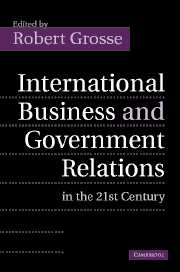Book contents
- Frontmatter
- Contents
- List of figures
- List of tables
- List of contributors
- Acknowledgments
- Introduction
- Part I History and theories of analysis of international business–government relations
- Part II The shifting international business–government partnership
- 5 Foreign direct investment and government policy in Central and Eastern Europe
- 6 Global warming and climate change: new issues for business strategy, government policy, and research on business–government relations
- 7 Business–government relations in the cultural industry: the evolution of the government's role in Korea
- 8 Multinational enterprise, public authority, and public responsibility: the case of Talisman Energy and human rights in Sudan
- 9 Direct private foreign investment in developing countries – the judo trick
- Part III Bargaining theory and the obsolescing bargain
- Part IV Host and home government views of international business
- Conclusions
- References
- Select bibliography of J. N. Behrman's works
- Index
7 - Business–government relations in the cultural industry: the evolution of the government's role in Korea
Published online by Cambridge University Press: 22 September 2009
- Frontmatter
- Contents
- List of figures
- List of tables
- List of contributors
- Acknowledgments
- Introduction
- Part I History and theories of analysis of international business–government relations
- Part II The shifting international business–government partnership
- 5 Foreign direct investment and government policy in Central and Eastern Europe
- 6 Global warming and climate change: new issues for business strategy, government policy, and research on business–government relations
- 7 Business–government relations in the cultural industry: the evolution of the government's role in Korea
- 8 Multinational enterprise, public authority, and public responsibility: the case of Talisman Energy and human rights in Sudan
- 9 Direct private foreign investment in developing countries – the judo trick
- Part III Bargaining theory and the obsolescing bargain
- Part IV Host and home government views of international business
- Conclusions
- References
- Select bibliography of J. N. Behrman's works
- Index
Summary
Introduction
The Korean economy has experienced dramatic change in just four decades, and recent developments have focused increasing attention on the future path for this dynamic economy (Kraar, 1992). Firms in any society can be analyzed in general by their interactions with other organizations such as the government, stockholders, workers or labor unions, consumers, environmentalists, and others. Hence, the general framework of the firm in a society can be schematically shown as figure 7.1. However, this general framework should be modified for countries where the government plays dominant roles through an industrial policy and other means.
In Korea, the government not only affects activities of firms directly, but it also intervenes in the relations between firms and other organizations within the society. For example, in the past in Korea's film industry, a film producer was required to attain the government's approval before producing a movie. The government was endowed with the powerful right provided by law to unilaterally prohibit a film production in consideration of market conditions. Furthermore, the government also wielded unfettered power in film imports. Government recommendation was a mandatory requirement when a foreign film was imported, and the government could choose to recommend only those film producers that had good track records in producing Korean films. In other words, the direct distribution of foreign films was prohibited until 1986, so multinationals in the film industry such as Warner Brothers, 20th Century Fox, Columbia, etc. had no choice but to export their films through Korean film producers in order to penetrate the Korean film market.
- Type
- Chapter
- Information
- Publisher: Cambridge University PressPrint publication year: 2005

